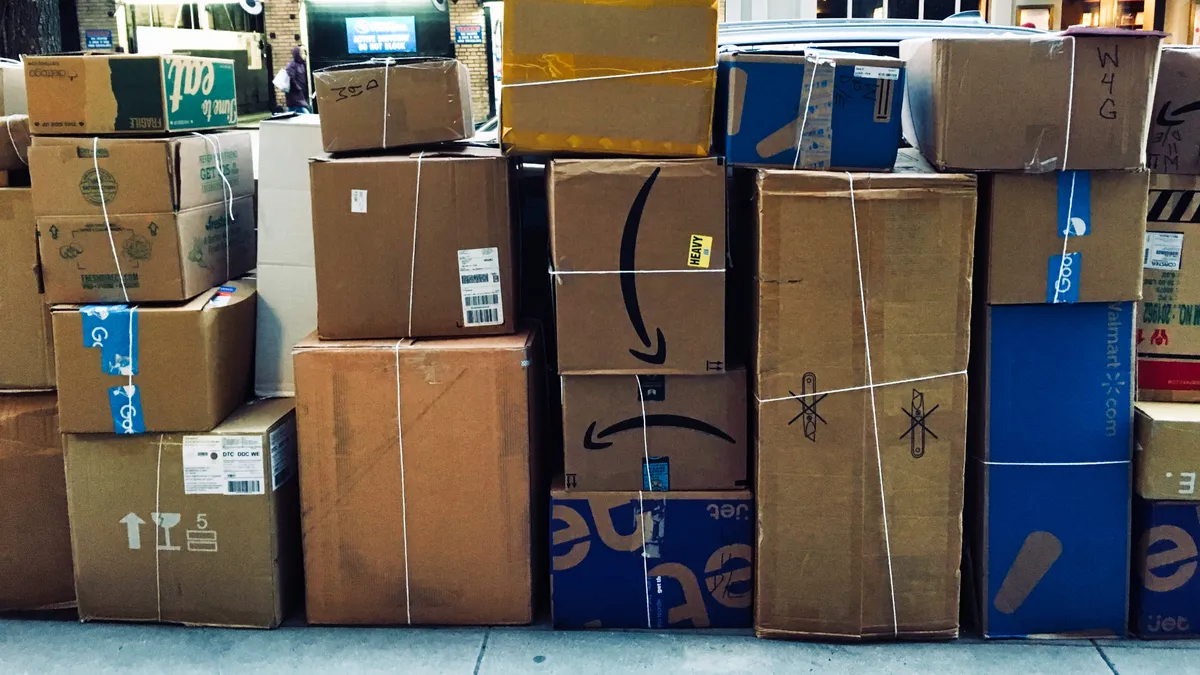Dive Brief:
-
Amazon held its first quarter earnings call Thursday, one day before a nationwide workers strike. CFO Brian Olsavsky took five minutes of airtime to discuss the company's difficult and controversial recent months, but neglected to mention the workers' walkout.
-
"What we've all seen transpire in the past two months has been gut-wrenching and unprecedented, but it has also been a time of heroic action by healthcare workers [...], and all essential workers in our communities," Olsavsky said. "This includes frontline Amazonians, our Whole Foods team, and our partners around the world."
-
By late March, workers at at least 10 Amazon warehouses tested positive for COVID-19. Simultaneously, some employees accused the company of inadequate and at times openly negligent practices in protecting them, The Daily Beast reported.
Dive Insight:
On Friday, International Worker's Day, or May Day, Amazon and Whole Foods workers across the country, alongside workers from Target, Instacart, FedEx and Walmart, protested unsafe working conditions, lack of personal protective equipment, and the absence of paid time off.
"We are acting [on] International Worker's Day to show solidarity with other essential workers in our struggle for better protections and benefits in the pandemic," Daniel Steinbrook, a Whole Foods employee and strike organizer, told The Intercept last week.
Workers say Amazon, in particular, has not been forthcoming about the number of coronavirus cases at its hundreds of fulfillment centers, The Intercept wrote. During April, Jana Jumpp, an Amazon employee in Indiana, has, with her coworkers, independently tallied over 500 COVID-19 cases at Amazon warehouses in the U.S.
On his call with shareholders, Olsavsky disputed the idea that Amazon failed to protect its employees.
"We took quick action to react to the higher order levels while continuing to provide for the safety of our workforce," Olsavsky said on the call. "We established rigorous safety and cleaning protocols including maintaining six-foot social distancing, procuring 100 million masks, tens of millions of gloves and wipes and other cleaning supplies, we began requiring temperature checks across our operations network. In our Whole Foods stores we added plexiglass barriers between cashiers and customers and reserved special hours for senior customers to shop."
Olsavsky said the company also temporarily raised wages and overtime premiums, funded a new Amazon Relief Fund, and allowed employees to take unpaid time off "at their discretion." Workers protested against the "unpaid" aspect of the benefit.
A small crowd of nurses, first responders and Amazon workers gathered in front of an Amazon warehouse in Staten Island, New York, in the California Bay Area, Los Angeles, Ohio and Kentucky Friday midmorning. According to The Washington Post, Amazon workers also gathered outside New York Gov. Andrew Cuomo’s office, posing by body bags, chanting, "This is our future if you don’t act."
"We've invested more than $600 million in COVID-related costs in Q1 and expect these costs could grow to $4 billion or more in Q2," Olsavsky said on the call. "These include productivity headwinds in our facilities as we provide for social distancing and allow for the ramp up of new employees, investments in personal protective equipment for employees, enhanced cleaning of our facilities, higher wages for our hourly teams, and hundreds of millions of dollars to develop COVID-19 testing capabilities."
Echoing Olsavsky’s words, Amazon spokeswoman Rachael Lighty told the Washington Post Amazon expects to spend more than $800 million in the first half of 2020 on coronavirus-related improvements, including raising wages by $2 per hour through mid-May.
"While we respect people's right to express themselves, we object to the irresponsible actions of labor groups in spreading misinformation and making false claims about Amazon during this unprecedented health and economic crisis," Lighty told the Washington Post. "The statements made are not supported by facts or representative of the majority of the 500,000 Amazon operations employees in the U.S. who are showing up to work to support their communities."
Due to the fairly small turnout, operations were not impacted by Friday's protest, Lighty said, adding that Amazon observed "less than 100 people at a handful of protests."
Whole Foods spokeswoman Rachel Malish echoed those remarks, saying the action isn't representative of the company’s 95,000 employees, and that the protesters misrepresented "the full extent of Whole Foods Market’s actions in response to this crisis."
Amazon-owned Whole Foods continues to operate stores and serve customers without interruption, Malish told the Washington Post, which Amazon chief executive Jeff Bezos also owns.














